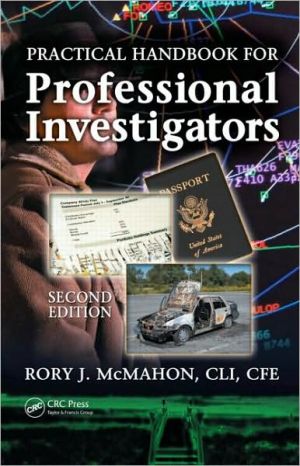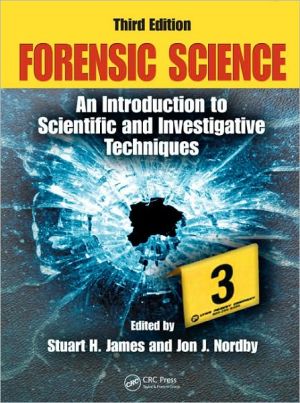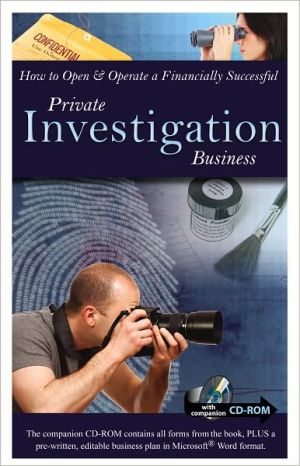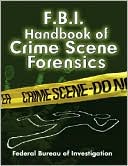Practical Handbook for Professional Investigators
Since the publication of the first edition of this volume, many new certification programs have begun in private and community colleges, including a course designed by the author for Boston University and a specialty certification by the U.S. Association for Professional Investigators. Reflecting the surge in interest into the investigative field, this second edition of the bestselling Practical Handbook for Private Investigators contains more than 20 percent new material and has been adopted...
Search in google:
Since the publication of the first edition many new certification programs have begun in private and community colleges, including a course designed by the author for Boston University and a specialty certification by the U.S. Association for Professional Investigators. Reflecting the surge in interest into the investigative field, this second edition of the bestselling Practical Handbook for Private Investigators contains more than 20 percent new material and has been adopted as required material in several new certification programs.A highly useful reference, the Practical Handbook for Professional Investigators, Second Edition describes the range of investigations for which a professional investigator's services might be required such as criminal investigations, fraud detection and investigation, surveillance, arson and insurance, skip tracing, and missing persons. Packed with case studies and examples drawn from the author's 33 years of experience, this handy resource covers everything from how to set up, market, and run an agency to the ethics of confidentiality and conflict of interest. It includes sections on how to get licensed, how to use various lo- and high-tech investigative tools including the internet, and how to take statements and implement effective interview and interrogation tactics by the non-law enforcement professional. New information in the second edition includes an updated and revised job description, realistic earning capabilities, and future outlook for the profession; new case studies involving legal investigatory practices and how to navigate the most recent privacy legislation; additional advice on case file management with examples of new paperwork and updated forms; and increased information on fraud and domestic cases, as well as the component method of criminal defense investigations.Designed as an up-to-date, nuts-and-bolts learning tool for students and as a day-to-day reference resource for the investigative professional of any type or level of experience, the Practical Handbook for Professional Investigators, Second Edition provides an unparalleled guide to the ins and outs of the world of today's private investigator.
Introduction 1Job Outlook 1Earnings 2Skills Needed to Become a Successful Investigator 3Three Methods That Investigators Use to Obtain Information 3What Is an Investigator? 3Attributes of a Successful Investigator 4Foundations of Investigation 9Types of Investigation 9Assignments Performed by a Professional Investigator 11Sources of Information 14Missing Persons 28Undercover Operations in Business Settings 36Asset Protection - Loss Prevention - Access Control 39Interviews, Interrogation, and Taking Statements 43Introduction to Interviews 43Purpose of the Interrogation 48Taking Statements 55Legal Investigations 67The Legal Investigator 67Structure of the U.S. Constitution 67The Bill of Rights 69Habeas Corpus 71Criminal and Civil Procedure 71The Concept of Crime 76The Effective Limits of Criminal Law 76The Authority to Arrest 77Investigative Detention Short of Arrest - Stop and Frisk 77Searches 77Interrogating the Accused 77The Trial 78Legal Investigations 89Role of the Legal Investigator 90Evidence 90Conducting Legal Investigations 93Case Study: United States v. Nancy Walter 94Fraud Investigation 99Corporate Fraud 101Economic Crime Schemes 104White-Collar Crime 108Corporate Crime 109Broiler Rooms - Telemarketing Fraud 119How to Conduct a Criminal Fraud Defense Investigation 131"Eating the Elephant" Defense Investigations for Complex Fraud Cases 132Case Study: Internal Fraud Investigation 141Sample Activity Reports 150Computer Crime 155Computer Crimes 155Computer Fraud 156The Computer Crime Investigator 158Investigative Methodology 158Areas of Computer Abuse 159Instimtional Vulnerability 162Investigation of Computer Fraud 165Computer Crime 166The Internet and the Worldwide Web 169Criminal Investigation 171The Investigative Function 171Role of the Criminal Investigator 172Reasons for Investigating Crime 173Limitations on Solving Cases 174Investigative Theory and Methods 175Types of Evidence 175Uses of Evidence 176Development of a Set of Suspects 176Methods of Investigation 176Phases of the Investigation 178Rules of Evidence 182Role of the Police 189Government Agencies 190Nuts and Bolts 191Conducting a Criminal Investigation 192Case Studies 192Component Method of Criminal Defense Investigation 195The Grand Jury 201Insurance and Arson Investigation 203Insurance 203Risk 204Probability 204Ideal Requirements for Insurability 206Insurance Contracts 206Negligence 209Insurance Adjusting 211Types of Insurance 211Government Regulation of Insurance 221Insurance Fraud 226Liability Claims Investigation 237Sample Investigative Report 238Sample Vehicle Fire Report 242Domestic Investigations 247Sample Activity Report 251Due Diligence and Background Investigations 255Due Diligence Investigations 255Scope of Investigations 260Content of Investigations 260Legal Constraints 262Preemoloyment Screening 265Locates and Skip Tracing 277The Basics of Skip Tracing 277Relevant Federal and State Statures 277Beginning the Process 278Skip Tracing Resources 279Searching for Financial and Business Information 283Searching for Legal Information 283Search Engines 284Internet Sites 290Government Records 291Surveillance 297General Rules 297Presurveillace 297Foot Surveillance 298Automobile Surveillance 299Stakeouts 300Tactics 301Surveillance Equipment 302Technical Suveillance 305Glossary 307Service of Process 311Types of Service 311Proof of Service 312Pitfalls to Avoid 312Florida Statutes Governing Service of Process 317Testifying in Court 335Pre-Trial 335The Trial 335Ethics 339Confidentiality and Privacy 340Truth 341Keep Informed 341Promote Education and Advocacy 341Business Conduct 341Avoid Conflicts of Interest 342Fair Representation to Clients 342Treatment of Competitors 342Legal Issues 343Render Services That Match Your Qualifications 343Reporting 344Compensation 344Advertising 344Client Relations 345Testimony 345Equal Rights 345U.S. Association of Professional Investigators (USAPI) Code of Ethics 346Ethics 346Investigative Ethics 347Finding a Niche 349How to Find Your Niche 351Double Check Your Choices 353Operating a Professional Investigative Agency 355Choosing a Name 355Form of Operation 355Location 356Pricing 357Bookkeeping 357Business Problems 359Licenses and Permits 359Taxes 360Tips for Operating Your Agency 360Case File Management 373"PI" Should Also Mean "Professional Image" 375Professional Associations 381National Associations 381Additional Specialty Associations of Interest 386International Associations 386State Associations 387Recommended Associations 396Getting Licensed 399








